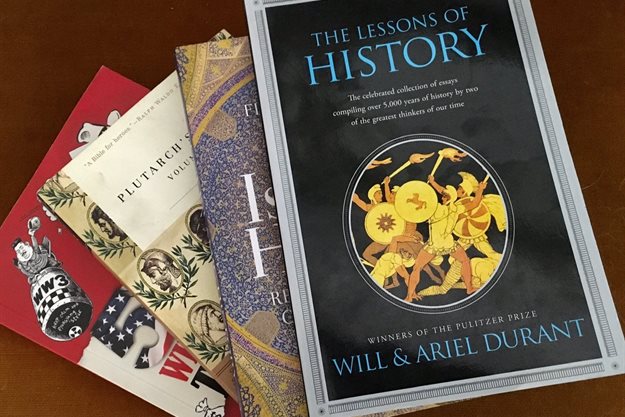






I did not do much reading this week, not for lack of will but because I went for laser eye surgery which forced me to turn to audio books instead.
Having nothing to do but close my eyes, lie back and listen was a refreshing experience in the world we live in where our attention is always split between the seemingly endless tasks and thoughts competing for our immediate attention.
I chose to use the time taking a trip back in time; because as a futurist, economist and trend analyst I am a firm believer that the further back we look, the farther ahead we’re able to focus. After all, even as short-term trends get noisier and noisier and more chaotic, if you are able to take a step back, zoom out and reflect on the bigger picture (as I was forced to do, lying down on my bed) it becomes ever more apparent that the macro and meta trends weaving through history are still very much in play, and by focusing on those long-run trends, we are able to get a much clearer focus on the future trajectory of our species. History may not repeat, but it sure does rhyme.
For my forced period of rest and reflection, I chose Dan Carlin (host of the popular podcast, Hardcore History) and his The End is Always Near: Apocalyptic Moments, from the Bronze Age Collapse to Nuclear Near Misses, and Ariel and Will Durant and their evergreen The Lessons of History (which I have read before and will read again).
The End is Always Near takes one on a whirlwind journey through ancient history right to our own times and highlights the precocity of the human condition, particularly from the perspective of civilisation, but also in a very personal sense.
When Dan Carlin penned the book in late 2019, 2020 was still on the horizon, yet he dedicated a chapter to the ever-present spectre of the pale horse of the Apocalypse and its effect on the trajectory of human history. (The pale horse, of course, representing plague, pandemic and disease. It was a pertinent reminder of the fragility of our shiny plastic and concrete-covered world. The veneer of the security of civilisation is skin deep.) This chapter, given the current context of our world, reminded me clearly of just how much foresight is focused by hindsight. Business and state leaders would do well to study the repeatable risks of history to plan better for their future survival.
The later chapters of the book turn focus to the very man-made omnipresent threat of Armageddon in the form of a nuclear holocaust. Just because climate change and the ‘robot apocalypse’ have become more popular twitter and dinner party conversation, the actual long-tail risk and threat of complete ruin by nuclear warfare has increased, not decreased since the days of Kennedy’s Cuban Missile Crisis. Out of (media) sight, out of mind… Yet if a relatively mild (by historical standards) pandemic could bring contemporary economies to a standstill in 2020, we would be fools to discount the other civilisational threats that have been with us all along. After all, it just takes one guy to push the proverbial red button. Can we really be sure that no man (or woman) will be born who will not eventually make that irreversible choice? (And that view even neglects the even greater risk of deliberate civilisational destruction by bioweapon. While nuclear weapons require big budgets and complicated technology only really available to state actors, bioweapons with equal destructive power can fairly easily be made and unleaded on the world by a teenager tinkering in his mom’s suburban garage…)
However, that is not a very cheerful view of history or the future. For that I return to Ariel and Will Durant and their rye, yet hopeful account of the arc of history, which has, against all odds, and despite our stubborn, selfish and self-destructive tendencies, still been (undoubtably) largely upwards sweeping and progressive, from both a technological and a social perspective.
If we take a long-range view and compare our modern existence, precarious, chaotic and murderous as it is, with the ignorance, superstition, violence and disease of primitive peoples, we do not come off quite forlorn. ~ Ariel and Will DurantWe should not give up on our species, we should, as Will Durant says, wage peace with as much vigour and determination as we have waged war. We are as a species as capable of great beauty and great progress as we are of great destruction and great mistakes.
The choice, really, is ours to learn the lessons of history or to repeat the mistakes of the past.